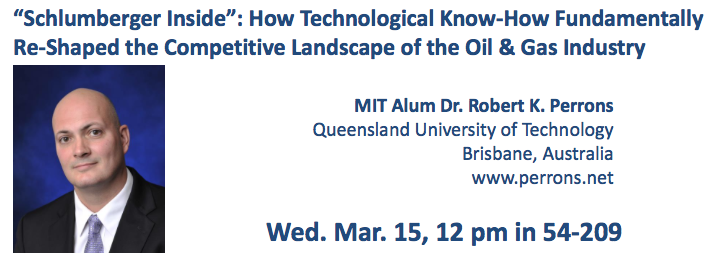Speaker:

Please RSVP Here
The MIT Mining, Oil, and Gas Club hosts Dr. Rob Perron, Associate Professor at Queensland University of Technology, presenting "'Schlumberger Inside': How Technological Know-How Fundamentally Re-Shaped the Competitive Landscape of the Oil & Gas Industry".
"In 1972, seven international oil companies (IOCs)—specifically, Exxon, Texaco, Socal, Gulf, Mobil, BP, and Shell—directly controlled 70% of the world’s total oil production. But Big Oil’s grip on the industry has weakened considerably since that time. Many IOCs decided in the 1980s and 1990s to dramatically pare down their in-house research and development efforts, preferring instead to leave many of these functions to oilfield service companies like Schlumberger, Halliburton, Baker Hughes, and Weatherford. This decision set in motion a pronounced shift of the sector’s technological center of gravity away from IOCs towards the service companies. This change also accelerated the process of resource nationalization in the sector. Whereas much of the technical know-how and equipment required to develop oil & gas resources used to reside more or less exclusively within the IOCs, many of these skills and resources can now be unbundled and procured directly from oilfield service companies. Accordingly, a large and growing number of nations have created national oil companies that, with the help of service companies, can monetize their hydrocarbon resources without the assistance of the IOCs. Consequently, national oil companies now control about 80% of the world’s conventional oil & gas reserves, and Western IOCs manage less than 10%.
Based on interviews with 38 executives, senior managers, entrepreneurs, and university researchers from the mining and oil & gas industries, this talk outlines the role that technological know-how played in the massive changes that occurred within the oil & gas industry during the 1980s and 1990s, and explains how these forces helped to reshape the sector’s competitive dynamics and bring about one of the largest transfers of economic power in history."
Prior to joining the Queensland University of Technology (QUT) in Australia as an Associate Professor in 2011, Rob worked in a wide variety of roles and locations for Shell International’s Exploration & Production division. He started his career in Shell’s Strategy & Economics team in 1997, and then worked for several years as a production engineer in the company’s overseas operations (offshore and onshore). He then left Shell for three years to work as an Industrial Research Fellow at the University of Cambridge, but re-joined Shell again in 2004 to become the company’s Executive Coordinator of R&D. He has a B.Eng. in mechanical engineering from McMaster University in Canada, a S.M. degree in Technology & Policy from the Massachusetts Institute of Technology, and a PhD in engineering from the University of Cambridge, where he was a Gates Cambridge Scholar. He is a Fellow of both the UK’s Institution of Mechanical Engineers (IMechE) and Engineers Australia, and is chartered as a Eur. Ing. in Europe. Also, he is a member of the Society of Petroleum Engineers, and continues to stay connected to the University of Cambridge as an Affiliated Researcher.
In addition to his QUT position, Rob serves the Australian Government on an ad hoc basis as a member of their “Expert Network.” His duties in this role include providing advice about the energy industry and emerging innovations in that sector, with the overarching objective of accelerating the commercialization of promising new energy technologies.
Please RSVP Here